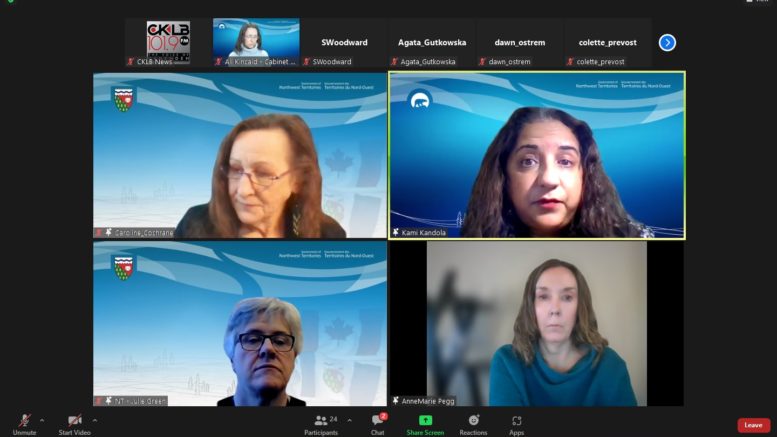New limits on gatherings in the NWT will kick in this afternoon at 5 p.m.
Dr. Kami Kandola, the territory’s chief public health officer, said the restrictions are an attempt to limit the spread of the omicron COVID-19 variant, as about 6,700 travellers return from the holidays.
Households will be limited to 10 people indoors with a maximum of five people from outside the home; all “high risk” activities, such as indoor sports, dancing, singing and handgames are cancelled; establishments that primarily serve alcohol (like bars or lounges) will have a maximum of six people per table. The advisory is not clear how restaurants are differentiated from bars or lounges.
During a news conference Tuesday morning, Kandola also said there have been 200 new cases of the virus in the NWT since New Year’s Eve.
“A number of these cases have been linked to super spreader events through household parties hosted over the holiday period,” said Kandola. “For the first time there are COVID-19 infections in every region of the territory.”
The incoming restrictions are scheduled to last up to and including Jan. 21.
Airport ran out of at-home tests
Last week, public health officials started asking residents to self-report positive COVID-19 tests taken at home.
An advisory said the tests would be distributed at airports, but Premier Caroline Cochrane said there was a “distribution issue” between Dec. 30 and Jan. 3.
Ultimately, Kandola said public health officials ran out of tests to give residents.
The premier said residents that returned between those dates could go to the Yellowknife airport today and tomorrow to pick up their at-home test as long as they had their boarding pass and/or ID.
But for those that have already left Yellowknife to go back to their community? Kandola said to just limit contacts for the first 72 hours after returning.
Public health has been asking returning residents to limit their contacts and self-monitor for symptoms for the first 72 hours after their returning since omicron entered the territory in mid-December.
But it’s still only a recommendation.
Asked why not make this a mandatory self-isolation period, Kandola said, “The least public health restrictions is what we’re aiming for because at some point in the near future, we will transition out of a public health order.”
Julie Green, minister of health and social services, also said the NWT government is starting to plan the end of the public health emergency but that “it’s more complex than just saying it’s over.”
Kandola explained public health officials were keeping an eye on “severe health outcomes” like ICU admissions and deaths to determine when that will be.
While early research has indicated omicron is a milder version of COVID-19, there’s still no date for when the territory will remove the public health emergency.





